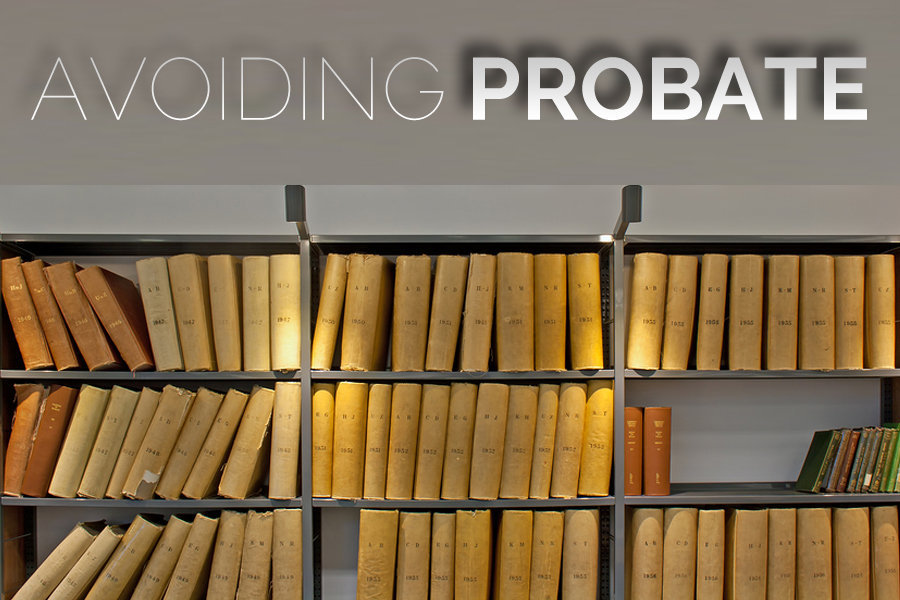
“The longest Will ever admitted to probate was 1,066 pages, and 95,940 words long! It was bound in 4 volumes. (Frederica Evelyn Stilwell Cook). It went to probate in 1925.” Even if your estate does not warrant a 1,066 page will you should provide for your heirs and estate with proper planning. The administration of your estate after your death does not have to be a cumbersome, painful process. Avoiding probate can save time, money and unnecessary headaches. There are some distinct advantages to creating a living trust instead of a will. One of those advantages is avoiding probate.
Why would you want to avoid probate? The probate process is a court procedure that involves establishing the validity of the will and administering the will as requested by the deceased. The validity of the will and the nominated administrator of the will have to be affirmed by the court. Creditors of the deceased have to be notified and paid. Assets may need to be appraised and sold prior to being distributed to heirs. Every individual state has its own laws regarding probate. If an estate goes to probate it will incur court costs as well as lawyer fees. Some people choose to try and administer estates through probate without legal assistance although this is not advisable. While hiring a probate attorney will cost money, there are many legal filings and deadlines that need to be met and the assistance of an attorney can be extremely helpful. If you are able to avoid probate altogether you can also avoid probate fees and legal costs associated with probate leaving your heirs with more to inherit. Probate also takes time. Going through probate and all the required legal steps can be a lengthy process. When going through probate, beneficiaries of the estate may wait a year or more depending on the complexity of the estate to collect their inheritance. In addition, probate is processed in open court. It is a public process so the details of the estate, debts and distribution become public knowledge. The details of your will become part of the public record and available to anyone that cares to review it. Probate is a slow, public and potentially expensive process.
How does a living trust avoid probate? If probate does not sound like the best option for you, you can create a living trust and transfer assets to it. A living trust is similar to a will in that it is a legal way to document your wishes for your estate after your death. A living trust is a basically a holding vehicle for your assets. Some assets such as pensions and annuities should be put into the trust for tax reasons; rather than pass them by beneficiary designation. The trust holds your assets during your lifetime and then transfers them to your beneficiaries after your death. You will appoint a successor trustee to handle the distribution of your assets as dictated in the trust. Your living trust bypasses the probate process altogether, “Property you transfer into a living trust before your death doesn’t go through probate. The successor trustee… simply transfers ownership to the beneficiaries you named in the trust. In many cases, the whole process takes only a few weeks, and there are no lawyer or court fees to pay. When all of the property has been transferred to the beneficiaries, the living trust ceases to exist.” A living trust is an excellent way to avoid the expense and time that probate incurs. Because your trust never goes to court, it is never made part of the public record. In this way, the terms of your living trust are able to remain private.
Living trusts are very effective at avoiding probate and beyond those already listed have some additional advantages. If you create a revocable living trust you can move assets in and out of the trust as you wish throughout your lifetime. A living trust also allows your chosen representative to act on behalf of your estate in the event of your becoming incapacitated.
There are a few instances when a living trust will not help you avoid probate. For instance, if you create a living trust but do not put your assets in the trust, then those assets will go to probate at the time of your death. That is why Living Trusts are usually created in conjunction with a special type of will known as a “pour-over will.” A pour-over will is a last will and testament that serves as a safety device to capture any assets that are not transferred to or included in a living trust and that do not pass by beneficiary designation or survivorship. An important part of creating a living trust is that it needs to be “funded,” meaning that your personal assets must be transferred into the trust document via the trust document and/or re-titling the assets in to the trust’s name. While “funding” a living trust can be an easy process, sometimes assets don’t always make it to the trust for a variety of reasons.”
Work with your estate planning professional to determine if a living trust is right for you. Not all assets automatically go through the probate process and depending on the size and items within your estate this may or may not be the proper estate planning vehicle for you.
